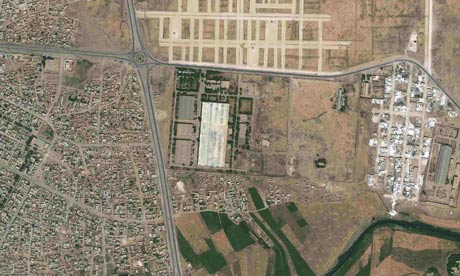International Atomic Energy Agency investigators say they’ve discovered a secret nuclear plant in north-western Syria. They claim the complex has a similar design to a uranium enrichment plant Muammar Gaddafi tried to build in Libya.
However, there is apparently no evidence of nuclear production at the site, which is currently used as a cotton-spinning plant.
UN investigators say the previously unknown complex in Syria adds to suspicions that the regime worked with A.Q. Khan, the father of Pakistan’s atomic bomb, to acquire technology that could make nuclear weapons.
Correspondence between Khan and a Syrian official has also been found by the UN nuclear watchdog, as quoted by AP. According to the correspondence the Syrian official allegedly proposed cooperation as well as a visit to Khan’s laboratories.
 |
| A satellite image shows the buildings in Hasakah, Syria, that the IAEA believes could have been intended for use as a uranium enrichment plant. Photograph: GeoEye /AP |
A senior diplomat and a former UN investigator both provided the data on condition of anonymity.
The allegations come during difficult times for Syria, which is already under immense international pressure. Dr David Halpin, a British anti-war activist, believes that the timing is not accidental.
“The first thing I’d say is ‘Here we go again’: the main pretext for invading and bombarding Iraq was weapons of mass destruction. My second thought is that a neighbor of Syria that still holds this land, the Golan, has by all accounts a large nuclear armory and weapons to deliver this over some thousands of miles – not only are there rockets, there are also the dolphin submarines which were supplied by Germany to Israel [..]. All these are things I do not know [for certain], but I would be deeply suspicious about any story arising now about nuclear weapons, chemical weapons now, because Syria is in the crosshairs very evidently.”
President Assad has refused to allow inspectors access for several years. Halpin told RT that if he were President Assad he would be “rather worried about letting any inspectors in.”
“As for the inspectors that went to Iraq for years, I’m told that one of their tasks was in fact identifying the defense installations in the country, making sure their positions were known.”
'Syria just wants to defend itself from Israel'
Political analyst Rabia Qais says that Syria’s nuclear program is not a new issue for the international community as it has been raised many times in the past.
He believes that Syria, like any other country in the region, is determined to have its own nuclear program to defend itself from a possible attack by Israel, as Israel is the only country in the Middle East that does have nuclear weapons.
“I think Syria, as any other regime in the region, has tried to have their nuclear program. But I think that Syria did not [reach] the state of production. Saddam Hussein’s past regime tried to build their nuclear [program] as well as Gaddafi’s regime, also the Iranian regime [is] trying to build a nuclear program,” he said. “But the political question is, why raise the voice now? The international society always is defending Israel and accusing the Arab countries.”

Israeli defense officials in Jerusalem have expressed concern thatclassified details of Israel's bombing of a Syrian nuclear facility last September will be disclosed during U.S. congressional hearings on the incident Thursday in Washington, local daily Ha'aretz reported on its website.
The American administration is slated to provide Thursday extensive details about the nature of the facility destroyed by the Israel Air Force (IAF) on September 6.
The Los Angeles Times reported Wednesday that U.S. Congress will hear from the Central Intelligence Agency (CIA) that the facility destroyed in the IAF attack was a nuclear reactor for producing plutonium.
 |
| The Syrian Nuclear Reactor was destroyed by the Israelis and then all evidence was wiped off the location |
Thursday's briefings of the Senate and House Intelligence committees, as well as the Senate Armed Services Committee, will deal with evidence that Syria was building a nuclear reactor that could be needed to produce plutonium, a U.S. government official familiar with the matter said Tuesday. Learning of the planned U.S. congressional hearings three weeks ago,
Israeli defense officials have expressed concerns that publication of classified details about the attack could compel Syria to resort to a violent response, or at any rate reignite tensions between Jerusalem and Damascus.
 |
In 2007, Israel struck a secret Syrian nuclear reactor, which was built with North Korean help. Syria denied the attack, and the reactor, but satellite shows that they attempted to erase evidence of both at the site. |
The information from the U.S. will evidently focus on questions relating to the type of facility that was attacked, the quality of intelligence that Israel and the U.S. had about the Syrian program, Ha'aretz said. The U.S. administration will probably volunteer fewer details about the manner in which the attack was carried out, and the forces and units that participated in it, the daily added. Israel, however, does not intend to break the official silence it has maintained on the matter for the past seven months. Israeli security sources told Ha'aretz on Wednesday night that the government will not go public with new information on the case. Israeli Prime Minister's office declined to comment on the matter Wednesday, and referred to Prime Minister Ehud Olmert's statements last week in his Pesach interview with media, in which he said that "the Syrians know what our position is, and we know what their expectations are," Ha'aretz said.
http://english.people.com.cn/90001/90777/90854/6398633.html

No comments:
Post a Comment